Hi Everyone,
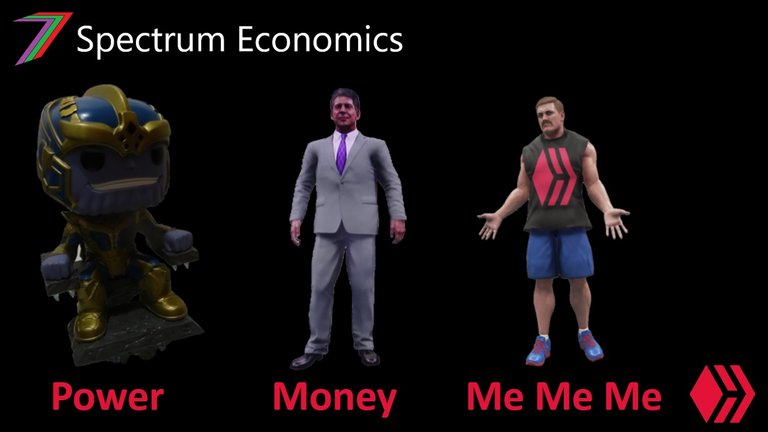
In today’s post, I would like to combine my knowledge of economics with some of my own philosophy. I will discuss rational behaviour and the influence of our own perceptions on everything we do. I will explore how both altruist behaviour and selfish behaviour ('Me Me Me' in the title) can both be rational. I will explore how positive perceptions of power and wealth support each other. I will explain why elected officials will not act in the best interest of the people they are intended to represent.
A common assumption in economics is rationality. Many will argue that this assumption is unrealistic. I am comfortable with the assumption of rational behaviour. This is mostly because of how I define rationality. Investopedia defines rationality as follows:
Rational behaviour refers to a decision-making process that is based on making choices that result in the optimal level of benefit or utility for an individual.
I believe rational behaviour is linked to perception. Perception can relate to consumption preferences, logic, time, information, other people, and other people’s perceptions. Perception involves seeing things from our own point of view. This is based on our own knowledge, experience, and emotion. We can learn to understand other people’s perspectives but that is only our perception of their perspective. Our perceptions could be quite accurate or we could be completely wrong.
Therefore, I would change the Investopedia definition to read as follows:
Rational behaviour refers to a decision-making process that is based on making choices that result in the optimal level of perceived benefit or utility for an individual.
Me Me Me
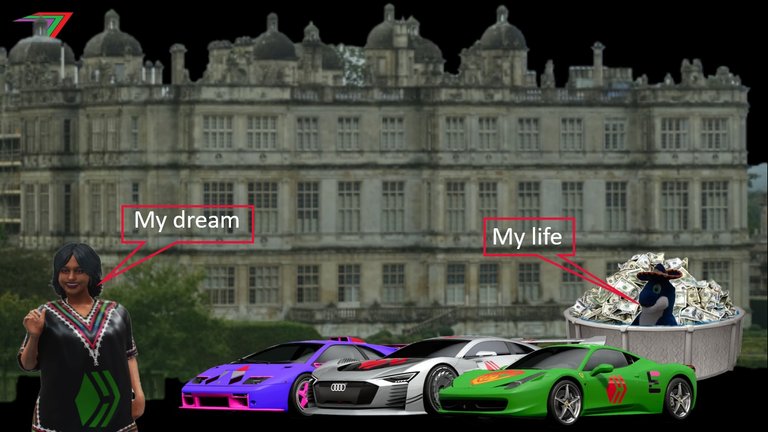
Our views about anything is limited to our perceptions. Therefore, our decisions and our actions are also limited to our perceptions. We have perceptions of what we want or need. We have perceptions of the satisfaction we can obtain from fulfilling a want or need. We have perceptions about how we can obtain a want or need. We have perceptions about the sacrifice required to obtain a want or need.
Imagine that you are thirsty. You believe drinking a liquid would quench your thirst. You could buy a drink from a drink store just a few metres away. You could walk another 200 metres and buy a drink from a different store. You could drink from a puddle on the floor. You could steal a drink from a feeble old person, who is likely to put up little resistance. In this case, the decision to satisfy your thirst depends on your perception of the type of drink you like, how much you are willing and/or able to pay, how far you are willing to walk, your respect for other people’s property and personal wellbeing, and other people’s opinions of your behaviour.
Different people will act differently when faced with the same circumstances because different people have different perceptions. Even though every person might do something different, all of their actions could be considered rational, as all these people are acting in their perceived best interests.
How about altruism?

Can altruist behaviour be rational? Could acting based on your perceptions of someone else’s best interest also be in your perceived best interest? The answer is likely to be ‘yes’. A person is likely to be acting in the best interests of someone else because they gain pleasure or enjoyment from that person's perceived happiness and joy. This enjoyment is likely to be perceived to be greater than acting purely in their own interests.
Different perceptions lead to different journeys and outcomes

Our perceptions make a huge difference to our lives and the lives of those around us. Let us look at perceptions relating to consumption preferences, logic, time, information, other people, and other people’s perceptions.
We could split the above types of perceptions into two groups. Group 1 consists of consumption preferences, time, and other people. Group 2 consists of logic, information, and other people’s perceptions. Group 1 relates to what provides us with value. Group 2 relates to how we understand value and how we may obtain value.
Group 1 requires a trade-off between what provides us with value. For example, a person could work on Saturday for 10 weeks (i.e. sacrifice of time) to earn money to buy a game console (i.e. obtain a particular consumption preference). For example, a person could spend a weekend (i.e. sacrifice of time) painting a mural on Grandad’s garage (i.e. obtain enjoyment from someone else’s happiness).
Figure 1: Influence of perceptions
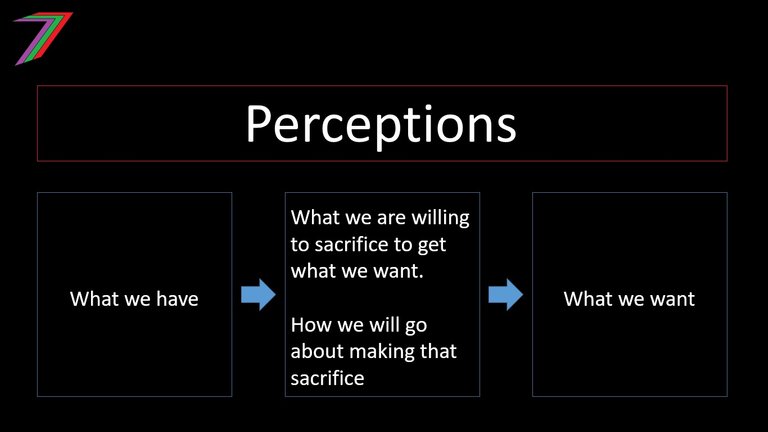
The relationships between perceptions in Group 2 is more complex as they influence each other as well as perceptions in Group 1. For example, our perception of the information we receive is influenced by previous information we have received, our analysis of this information (i.e. logic), and our perceptions of how other people perceive this information. Our approach to logic is influenced by our perception of knowledge and influence other people have on us. The extent of influence other people have on us depends on our perception of them. The combination of all these different perceptions shapes what we want, how we go about getting it, and what we are willing to sacrifice to get it. Figure 1 contains this flow of events.
Emotion
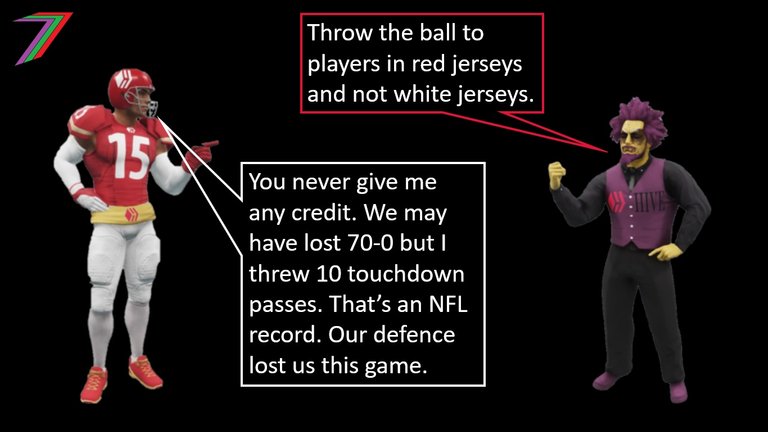
An immediate response to our emotions can stunt our perceptions and lead to bad decisions. Emotion can narrow our thought process and lead to us to disregard particular consequences. For example, one person criticizes another person. The criticized person responds by punching the criticizing person. The emotion could have stunted the person’s perception to only recognise the criticism as an attack and the response of a punch could have been perceived as an act of defence.
In the longer run, our emotion can alter our perceptions. If we experienced a positive emotion, we would engage in actions that could repeat the experience of that emotion. If we experienced a negative emotion, we would engage in actions that would enable us to avoid the experience of that emotion. These responses could lead to us either limiting or expanding our perceptions.
The role of education

I believe a good education is fundamental to shaping our perceptions (I define what I mean by a good education in my post 'Education – Prevent, Solve, or Manage'). An education system that focuses on preparing us for the workforce rather than life in general can be expected to skew our perceptions towards valuing material wealth. Thus, diminishing how we value our free time and even our informal relationships with others. A good education system should allow us to develop our own perceptions by enabling us to explore as many avenues as possible. Likewise, a bad education system would contain a rigid dogmatic syllabus, which aligns our thought process to the benefit of those that hold power (discussed later in the post). Hence, we have the breeding of the shallow and easy to control ‘Me Me Me’ attitude.
Money (wealth)
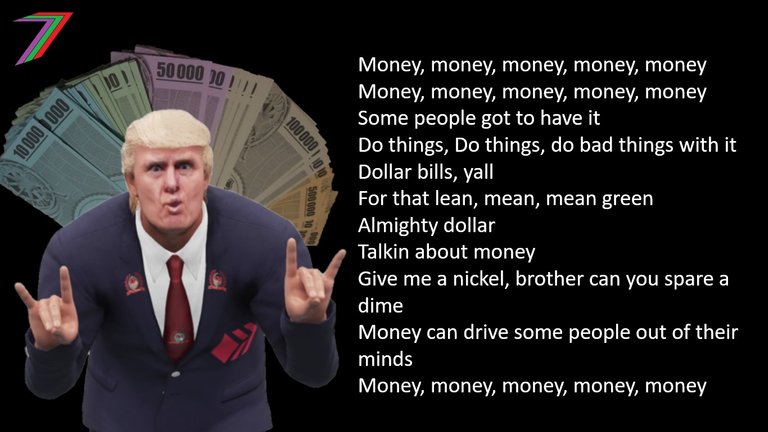
Our perceptions do not just affect ourselves but society as well. Let us look at the possible paths a person could take to acquire wealth. Image two people, the first person has a high perceived value for material wealth but does not consider other people important in anyway. This person could be inclined to acquire wealth at the expense of others as he or she would not feel negatively impacted by the suffering of others. The second person may also value material wealth but he or she is negatively affected by the suffering of others. This person could be inclined to earn wealth in a manner that does not harm others. This person could even earn wealth through helping others. The first person could be a psychopath and the second person could be a capitalist but both are acting based on their perceptions of what they believe is in their own best interest.
Wealthiest in the world
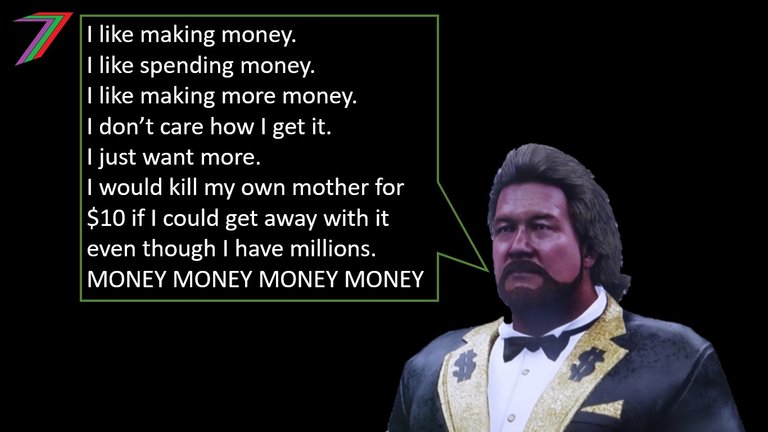
The wealthiest people in the world have wealth because they perceive it to be important. If they did not perceive it to be important, they would not have so much of it. The wealthiest people in the world have a successful strategy of either obtaining wealth or at least maintaining the wealth they have obtained. Their strategy will depend on what they are willing to sacrifice and how they utilise the information and the people around them. The sacrifice could come in the form reduced leisure and relaxation time and/or at the expense of other people. Their strategy is more likely to be successful, the less they value things other than wealth. Their strategy is more likely to be successful, the more reliable the information they have and the greater the ability and commitment of the people around them.
Power
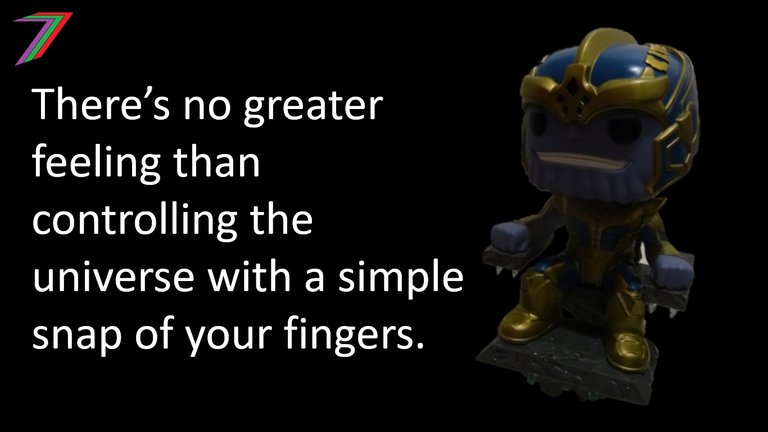
Some people desire money for what it can buy. Other people desire money for the power and influence it can bring. The latter, would aim to acquire wealth because of their perception of people rather than their perception of consumption. A person could desire power for many different reasons. These reasons could include self-glorification, attention, ambition, and even altruism. However, power involves controlling other people. Therefore, the desire for power is also the desire to control people. There are two common methods of controlling people. One method involves giving people something they want in exchange for their obedience. For example, giving someone money in exchange for his or her obedience. The other method involves not giving them something they do not want in exchange for their obedience. For example, not killing someone in exchange for his or her obedience.
Connection between the powerful and wealthiest
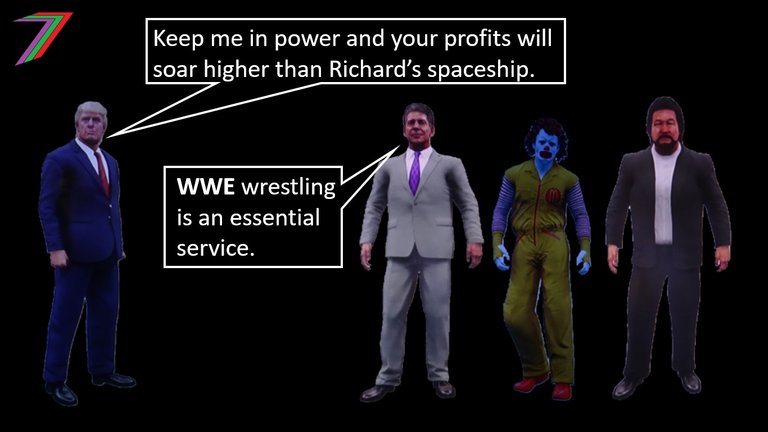
Acquiring wealth is an avenue to becoming powerful and becoming powerful is an avenue to acquiring wealth. Wealth can be used to gain attention and influence. It can be used to portray a positive image of the person seeking power and a negative image of anyone opposing them. Power can be used to provide an advantage to those pursuing wealth. It can be used to provide essential influence and information that can help increase a person’s wealth. The most powerful and the wealthiest people should naturally aim to support each other as much as possible, as they offer the most to each other to obtain their highest perceived goals.
How does this affect world leaders?

In a representative democracy, people have the option to vote for parties or people to run the Government. All those running in the election seek power. To be in a position to seek power for a high office, the candidates must strongly desire power and must have committed resources or made promises to be in that position. It is in the best interest for all these candidates to serve those that have given them the opportunity to gain power. It would be illogical for someone who values power above all else to want to be of service to the people they claim to be representing. Whoever becomes the leader, will continue to act in their own perceived best interest, which is to control the population and reward the wealthy people that have contributed to their ascension to power.
A representative democracy guarantees that leaders and Government will not act in the best interests of the people that they claim to represent. This is because a person who would act in the best interest of the people would never be in a position to become leader. A monarchy or a hereditary dictatorship could provide a leader who cares and would represent the people. This is possible because, this type of leader may perceive the happiness and representation of the people of his or her country to be important. This is possible because this type of leader does not need to position themselves to be leader; they are just given this role. A lottery of the population of the country would be a superior method to determining Government and leaders than any existing form of representative democracy.
Final Thoughts
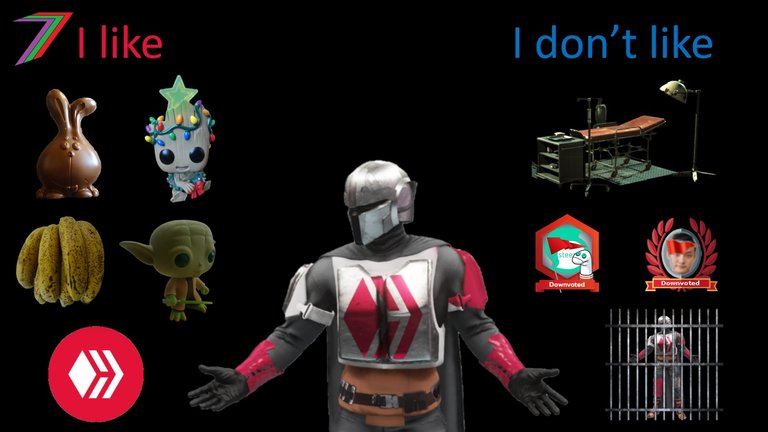
I believe our perceptions determine everything we do. It guides our thought process and determines what we consider valuable and what we do not. We can change our perceptions by exposing ourselves to new information, experiences and people. Acting on our perceptions can be beneficial or detrimental to society. Developing empathy can alter our perceptions and ultimately our actions. Empathetic people can act in their own best interest and to the benefit of society.
Sadly, we live in a world where people who perceive the value of their own power and/or wealth significantly more than the welfare of society have the most power and authority. This has occurred because of the political systems we have in place (i.e. representative democracies). This has occurred because of the economic systems we have in place. We have oligopoly market structures dominated by very large businesses who control price and output. We have Governments intervening to ensure these types of markets are kept in place.
I am advocate of decentralised systems, which cannot be controlled by a few powerful and/or wealthy individuals. A decentralised system has been something very difficult to build in reality. The arrival of the blockchain and the possibility of a blockchain economy could change the way society functions.
The content of this post has been presented based on my own perceptions.
More posts
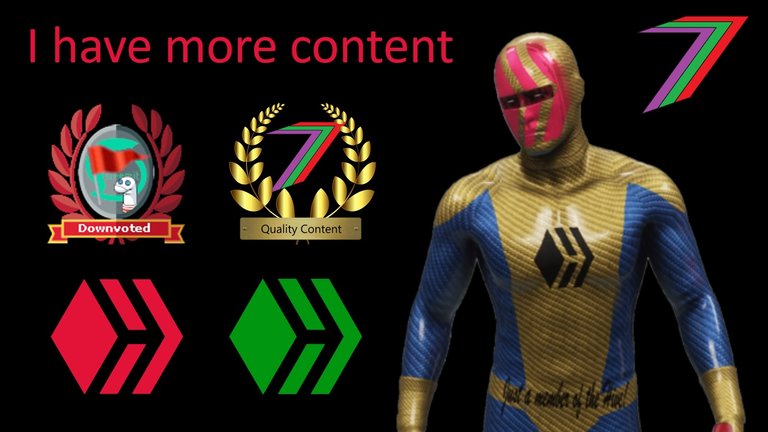
If you want to read any of my other posts, you can click on the links below. These links will lead you to posts containing my collection of works. These posts will be updated frequently.
Future of Social Media
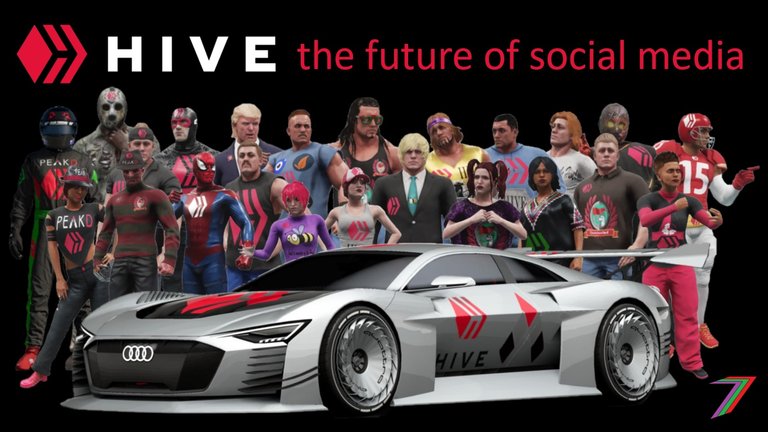




Put much better than I could have! Hopefully also understood by a broad range of people. Few seem to get it when I try to tell them that demanding more laws from the very people who are allowing these issues to occur in the first place is not going to get you what you want. They won't enforce anything unless it's in their own best interest, so you might get that law to prevent logging in a certain area and they'll happily use it to reel in money from fines from small companies who might stray a bit far, or maybe people collecting firewood there, but when a big company comes along who can offer way more reward than that, they'll turn a blind eye or make a clause.
Thanks @minismallholding. I think we often see people in power create problems or just let them happen so that they can provide solutions that benefit them.
I believe it is a problem with the system. It is is difficult to change the system because the people that run the system benefit form it the most.
I'm not really a materialistic person, but it sure would be nice not to struggle with basic needs. Not that I am, just wishing that for everyone out there.
Otherwise, I started on my economics degree back in the day and I dropped it like it's hot!😂You're very passionate about money and wealth, great post, though to be honest I struggle to read from this account, today was better, less numbers lol.
I think it depends how balanced a person's perceptions are. Striving for some reasonable comfort, should be expected. However, once that comfort is reached, the cravings for more and more wealth can continue. I think if we are to see the bigger the picture, it is a lot easier to be happy without the need for more.
Some of my posts can be quite technical. I think numbers and graphs come more naturally to me than words.
I think it's in human nature to want more.Takes a lot of discipline and self control to be contented with what one has.
How ironical. I think you're one of the most wordy ppl I know on here haha ... I'm jealos, wish numbers came to me as easy as they do for you, I'd be raving it up:D :P
Great Weekend to to Captain!👮
The challenge for me is getting what's in my head into words so that it maintains the same meaning. My thoughts are a mixture of pictures, sounds, and a lot of other stuff. My thought process does not necessarily follow a linear sequence that translates nicely into words.
When you say this, whose interest does the leaders in this system now represent? Or are you talking practically of one of the modern representative democracy we have nowadays?
Well thanks for this mind boggling post. I do believe also that perception forms s solid core of our self as humans. So can I say a person's perception irrespective of how flawed it may be be rational?
@tipu curate
As with anyone, leaders of countries act in their own best interests. However, the journey to the highest levels of leadership requires a particularly power driven mindset or else that person will not get the opportunity to lead.
Representative democracies consistently offer the same types of leaders with very similar mindsets and ambitions.
You would have a difficult time finding a leader who has gone to great effort to obtain power just so that he or she could genuinely give the power back to the people.
Of course now I understand you. The core of representive democracy shouldn't be like this really but I guess e humans have defined it differently with the modern rulers we have in power nowadays. However it's really pathetic, people should be the focal reason for representive democracy sadly this isn't true. Thanks for replying.
I'm right there with you. I hope we can achieve that here, at least to some degree. We've got a long way to go, but the momentum is there.
I think we are heading in the right direction. We still have a lot to learn. We still need to persuade others that a blockchain alternative is an improvement over the systems they are trapped in.
At the end we are supposed to die naked. Selfishness is the basic human trait which can't be hidden. Even altruism is a form of selfishness as one helps another because he/she gets a satisfaction from the act.
Yeah, that is pretty much how it works. Still, altruism is still better even if the intentions behind it are not pure.
True that.
Wonderfully explained and that too in details pretty nice that was to read and learn some things
That's great, I'm glad you enjoyed the read.
Yeah always great to read its interesting as you got to know a lot of different stuff in your posts which many of us are not even aware about in today's world thanks for bringing lots of great and unique stuff on this blockchain keep going :)
What makes you more happy in the end?
You chase whatever like. I suggest that you try and understand what makes you happy first.
This is interesting
Thanks
Great article
Thank you
awesome..
follow me